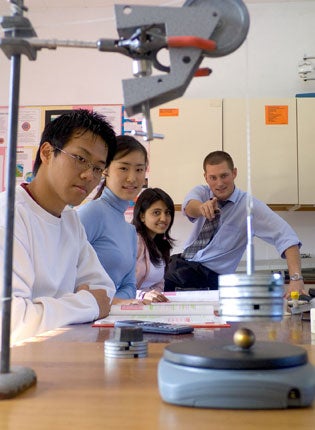Tories want to promote science in league tables
Plan to boost maths and physics comes under attack from head teachers

Your support helps us to tell the story
From reproductive rights to climate change to Big Tech, The Independent is on the ground when the story is developing. Whether it's investigating the financials of Elon Musk's pro-Trump PAC or producing our latest documentary, 'The A Word', which shines a light on the American women fighting for reproductive rights, we know how important it is to parse out the facts from the messaging.
At such a critical moment in US history, we need reporters on the ground. Your donation allows us to keep sending journalists to speak to both sides of the story.
The Independent is trusted by Americans across the entire political spectrum. And unlike many other quality news outlets, we choose not to lock Americans out of our reporting and analysis with paywalls. We believe quality journalism should be available to everyone, paid for by those who can afford it.
Your support makes all the difference.An overhaul of school league tables to give more weight to A-level performance in maths and physics is being planned by the Conservatives.
The scheme, under which vocational qualifications and the Government's flagship new diplomas would be controversially removed from rankings, last night came under fire from headteachers and ministers, who rejected Conservative claims that the shake-up was necessary because A-levels had been "dumbed down" under Labour.
The proposals, outlined by the shadow Schools Secretary Michael Gove, would see schools ranked on a new point-scoring system at both A-level and GCSE which would give more weight to "academic" subjects such as maths and physics at A-level. The old ranking based on the percentage of pupils getting five A*- to C-grades at GCSE (including maths and English) would go.
Last night Mr Gove told The Independent he accepted a proposal from John Dunford, general secretary of the Association of Schools and College Leaders, to "cap" the number of GCSEs counting towards the new point score at eight as "eminently sensible".
Mr Gove's package, which emanates from discussions with a Tory-instigated inquiry into exams headed by Sir Richard Sykes, former vice-chancellor of Imperial College London, would also remove vocational qualifications from the league table rankings and force schools to track and reveal where school-leavers end up.
Responding to a claim by Dr Dunford that the removal of vocational qualifications would "perpetuate the English disease" whereby they were considered second-class, Mr Gove said evidence showed that "historically more young people could benefit from a rigorous academic curriculum".
Mr Gove said Labour's "meddling and micromanagement of exams" had led to a "dumbing down" of the system.
"The current system [of league tables] just isn't working," he said. "Schools are measured on the percentage of pupils who get five C passes or better at GCSE, including maths and English. The result has been a massive skewing of effort... with the attention given to getting the pupils on the borderline between a D and a C pass up to C level."
On A-levels, he added: "Every A-level is assumed to be of equal value when it comes to measuring school performance but universities don't consider every A-level to be equally rigorous."
"We know that some schools steer students away from particular A-levels, in areas such as modern languages, because they are believed to be harder," he said. "We want Sir Richard to look at how A-levels... can be put on a stronger footing. Wouldn't it be better if schools published more detail on the specific subjects in which passes were secured and also the university, or employment, destination of school-leavers?"
Sir Richard's interim report is due to be published by the end of the year.
Dr Dunford said he welcomed the move towards a point score from the current way of ranking schools on high grade GCSEs because it "gives more credit for raising the achievement of all pupils". However, he argued for the point score to be capped at eight subjects including maths and English to avoid pupils being put in for too many exams.
He said it would be a "retrograde step" to separate academic and vocational results, adding: "The measure would perpetuate the English disease of making vocational subjects second best."
A spokesman for the Department for Children, Schools and Families, said: "We simply don't recognise labels of 'hard' and 'soft' A-levels and all subjects are rigorously monitored against each other to maintain standards."
The rise in pupil numbers staying on at school and taking A-levels was "surely something to celebrate". The take-up of maths and science had also improved.
Join our commenting forum
Join thought-provoking conversations, follow other Independent readers and see their replies
Comments